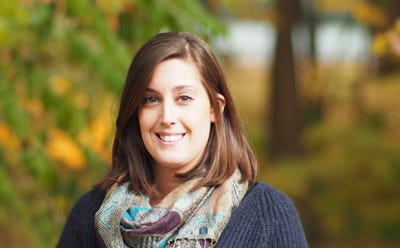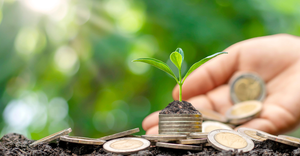Waste Management’s Solis is a Champion for Health, Wellness, Safety
The Waste360 40 Under 40 award recipient discusses how a job as a bank teller led her to become the public face of one of the company’s largest transfer stations.
Erika-Alexandra Solis has only been in the waste and recycling industry for a few years, but she has already made a lasting impact.
Solis is the construction and demolition diversion manager and recycling program manager at Waste Management’s Davis Street Transfer Station, serving the Northern California and Nevada area. A former bank teller who sought out a more impactful career, Solis has become the public face of the transfer station, as well as a champion for health, wellness and safety at the facility.
“Erika has an unquenchable thirst to succeed and a consistent positive attitude,” says Barry Skolnick, Waste Management's area vice president for Northern California-Nevada. “She was hired at Waste Management after receiving a recommendation from a current manager who vouched for her work ethic and desire to be a manager. We’ve never regretted hiring her.”
“Despite having no background in the waste industry, she quickly learned about the industry and began suggesting ways we could improve our MRF [materials recovery facility] operations,” adds Skolnick. “She has a positive relationship with frontline workers and is always complimented by visitors who take a tour of Davis Street.”
Earlier this year, Solis received a Waste360 40 Under 40 award. She recently spoke with us to discuss how she got into the industry and why the next generation of workers should consider waste and recycling as a meaningful career choice.
Waste360: You’re relatively new to waste and recycling, and from what I understand, you were a bank teller before entering the industry. How did you get your start in the industry and what drove you to it?
Erika-Alexandra Solis: While I attended school, I was a teller for four years. As soon as I graduated, I decided the banking world was not the place for me. I decided that I needed to look for a career, not a job, and I put in my two weeks without knowing where I was going to go next.
I heard about a position as a supervisor at Waste Management, and I thought, “Well, I did graduate in corporate management and accounting, so I think I can do it.” I applied and interviewed while I was still a teller, and probably a week after I finished my employment with the bank, I received the call that I had been accepted as a supervisor for the materials recovery facility. One of the things I think that really helped me was the fact that I was eager to learn the business even though I didn’t have any background in it. The managers here saw that I was dedicated and thought, “She can bring skills that we haven’t had in a long time, and we can teach her the rest. The training and experience will come.”
As the MRF supervisor—a role I was in for two years—I supervised more than 40 employees. I helped implement a program with Lean [Enterprise Institute] to make the system more efficient. I constantly looked for ways to improve safety, morale and productivity. All of that experience has helped me advance into my current role.
Waste360: Tell us about your role as construction and demolition diversion manager and recycling program manager at Waste Management.
Erika-Alexandra Solis: I focus on all types of waste streams, not just construction and demolition. At the time I started the position, the main focus was construction and demolition, but the role has since expanded to include all the different waste streams we receive at the transfer station—single stream, commercial recycling, dry waste, regular trash, food waste and so on.
I analyze the material that we receive in the form of audits. I conduct all the required audits for the different waste streams, and I communicate my findings. The results from the audits help internal and external stakeholders understand the composition of the material as well as how well we are recovering materials at the MRF. The managers at our facility and the municipalities we service use that information to create programs that improve material recovery, decrease contamination and increase diversion from landfills. That is just one part of my job.
When I began working in this role, I reported to the program’s recycling manager. About a month later, she left the company and most of her duties were passed down to me. Now, I oversee the recycling programs, as well as audit compliance and reporting. In this role, I also support operations at the transfer station. I assist all the departments with processing plans and help find ways to make operations run more efficiently. This is where my background in Lean helps, too.
I also conduct tours for anyone who is interested in knowing about where material goes after it’s picked up at the curbside. I provide tours to college students, government agencies and organizations with green teams that are looking for ways to reduce waste and do their part in recovering recyclable materials better. The groups that visit the Davis Street Transfer Station come from local communities as well as from across the globe—actually, I have a delegation from India coming in soon. So, it’s really fun to get to meet people from a lot of different places and backgrounds and to be able to share with them the knowledge I know about the industry and recycling world. It’s fun; it’s different every day.
Waste360: How are you able to highlight safety in the workplace and work with the employees you manage to help them thrive?
Erika-Alexandra Solis: Waste Management has a robust safety program. I help with training and assist in developing site-specific safety programs and SOPs [standard operating procedures]. Just now, I was in a meeting about updating a current safety program to incorporate a new safety regulation. Once we determine the new process, we will roll it out to the employees, so they are aware of the new changes.
Safety and health go hand-in-hand. I help promote health and wellness throughout the site. As the health and wellness champion of the facility, I coordinate different events—walking challenges, 5Ks and healthy-eating activities—to get people thinking more about their health, so they can continue to work here and be safe doing so. We encourage employees to do daily ergonomic stretches before work to avoid injury. There are a lot of different programs that we try to incorporate to keep the employees engaged. Our facility’s main goal is to send our employees home safe back to their families every day.
We just finished a walking challenge using an app where we could see everyone’s steps. The participants were really engaged and excited because everyone got competitive. At the end of the challenge, we gave away Fitbits, so they can continue their health and wellness journeys. Everyone was very excited about their accomplishments and their prize.
Waste360: As the company’s recycling program manager and public face of the transfer station in the area, how are you able to work with the public and engage such a diverse community?
Erika-Alexandra Solis: I understand that I am fairly new to the industry and that the industry itself is constantly changing. Not only do I have to keep myself informed on operational changes that occur in the company and within the facility, but I try to keep myself up to date with any new laws, regulations and other world news that might affect the environment that we live in. As environmental stewards, it’s important to know and understand these changes and how we can all do our part in one way or another. This is how I like to prepare myself when I attend city board meetings and conferences.
On tours, I usually follow a format. I start with a video about the facility, then a presentation about the different areas of our site and finally the site walk or drive through. Our site is large—it’s 54 acres has numerous recycling processing facilities and transfer facilities. We do it all, and we try to be the one-stop shop. It could become overwhelming for someone who hasn’t been in the industry before or maybe doesn’t have that background. I welcome any questions throughout the presentation and during the site tour. Although I follow a format, all tours end up being different as well as the conversations we have.
It’s great because questions are always coming up, and sometimes I don’t know the answer to all of them, but I learn from that and make sure that next time I’ll know the answer. What I’ve learned is that people are always willing to listen, learn and share, and the dialogue is always very engaging. We talk about what we can do as a community—either on a local level or a bigger scale. It’s fun. I enjoy meeting people from different areas and connecting with them.
Waste360: Why should younger generations of workers consider the waste and recycling industry as a viable career choice?
Erika-Alexandra Solis: Growing up, I didn’t really pay too much attention to the environment and how much we waste as a society. Until I started working here, I didn’t realize how greatly our actions impact the course of global warming and climate change, which is a very real thing. We should all be paying attention to what we do now because future generations will be affected by the decisions we choose to make today.
My work in the industry recently motivated me to return to school to earn my MBA. And I feel like now, in my position and with the experience I’ve gained so far, my eyes have been opened. I believe I have a responsibility to share with others what I’ve learned so far and inspire them to think about what each of us can do to make a difference in the world and the communities that we live in. We all have a responsibility to take the steps needed to build a more sustainable future. If we don’t think about solutions for environmental issues, then we aren’t going to be able to thrive as a society.
The waste and recycling industry is growing, and new opportunities are opening for the next generation of young workers looking to join the workforce. Although the work is relentless, this industry gives me a sense of purpose that I think young people will also find rewarding.
Waste360: What mark do you want to leave on the industry now and moving forward?
Erika-Alexandra Solis: Since I began working in the industry, I have been able to amount to heights I’ve never imagined, and I hope that my work continues to take me to inconceivable levels and allows me to break barriers. I am very grateful for the those around me who push me and continue to support me to reach my full potential, and now, I feel more confident about the ability to make a difference, whether it’s big or small.
As I continue to learn and gain more experience, I aspire to be a district manager for a Waste Management site one day and continue to move up in the company and in the industry. I enjoy seeking process improvement opportunities, and I hope that I can inspire others to look for ways to make constant improvements in their communities and beyond. For now, I continue to take one day at a time as an opportunity to gain the necessary skills and knowledge that will take me to the next step in my career.
About the Author
You May Also Like




